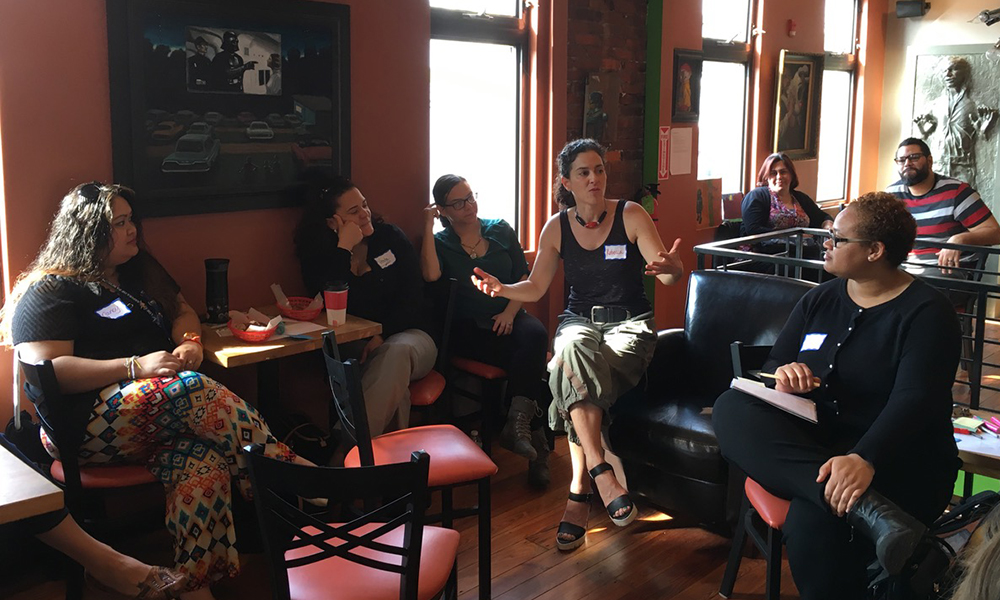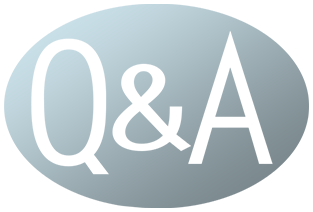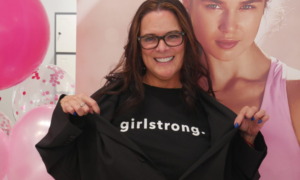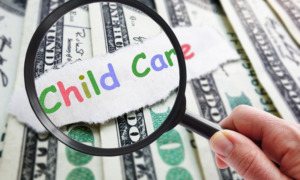
Courtesy of Rebecca Fabiano
Rebecca Fabiano (fourth from left in black tank top) founded The Sandbox monthly networking and professional development session in 2013.
Rebecca Fabiano is president and founder of Fab Youth Philly. Sara Hill asked her a series of questions about her work. Her answers have been lightly edited for length.
Q: How did you get into the youth development field?
A: It started when I was in high school. I was trained to give presentations on date rape. I was a peer educator. My first real job was after college at a place called the City Volunteer Corp, an AmeriCorps program. I was a field supervisor for teams of 15- to 21-year-olds. One week we’d be cleaning parks, another week we’d be at a nursing home. I left to work at an HIV agency as an outreach worker to train teenagers about health and sexuality with an emphasis on prevention. The teens would become peer mentors as well as do street outreach.
 At this point in my life, I had no idea what I wanted to be, or what kinds of jobs were out there. Back then I’d look in the job postings in the newspaper, and I didn’t know what titles to look for. I got a master’s in secondary education in health, and after I did my assistant teaching, I was placed as a permanent substitute at a small alternative high school in Manhattan as a health and dance teacher. I applied for and got hired to run an after-school program at a large high school. I was there for seven years. I started in a coat closet. It was just me and the lunch lady. I grew the program to a year-round program, offering youth development activities during the school day and serving over 3,000 kids.
At this point in my life, I had no idea what I wanted to be, or what kinds of jobs were out there. Back then I’d look in the job postings in the newspaper, and I didn’t know what titles to look for. I got a master’s in secondary education in health, and after I did my assistant teaching, I was placed as a permanent substitute at a small alternative high school in Manhattan as a health and dance teacher. I applied for and got hired to run an after-school program at a large high school. I was there for seven years. I started in a coat closet. It was just me and the lunch lady. I grew the program to a year-round program, offering youth development activities during the school day and serving over 3,000 kids.
Q: What did you learn that you’d wish you learned from the start of your career as a youth worker?
A: I wish that I had learned the importance of networking, and developing my reputation and my “brand.” Also, the importance of staying up to date. It took almost 10 years to realize that there was something called a youth field. I think that there’s a big disconnect between the folks who are writing about the field and the folks who are actually doing the work. We need to do a better job at bridging that divide.
Q: What are the biggest changes you’ve seen in the field?
A: I would say that I’ve seen the field evolve in a more professional manner. Our field has become more focused, more easily identified as a field. We’ve become more intentional about standards and competencies. We’ve become better at naming what we’re doing. A change that I’ve observed with young people is that they are living more publicly than ever. They shape their identities via social media, and I’m not sure how that benefits them. And how that enhances their development, and what we can do to support that.
Q: How do you battle burn-out, stay resilient?
A: I think youth professionals need to visit other people’s programs, see what other people are doing. Find a peer group. I cannot emphasize enough the importance of a group of peers who you respect and trust. Who you can meet after work to share an adult beverage. Also, it’s important to have some hobbies that don’t have anything to do with what you do at work. Also, having a mentor is important.
Q: What do you think is the future of the field?
A: I would like some of the older white professionals to intentionally foster new leadership, particularly to bring in more diverse professionals, not just people of color, but trans folks and other groups as well. How do we gracefully pass on the baton, and how do we intentionally prepare for that?
Q: What’s some advice you would give someone entering the field?
A: I would recommend that you get a mentor, and plan to become someone’s mentor. You should be on a minimum of 10 different listservs or newsletters. Get curious, learn how to develop partnerships. I would also say that it doesn’t have to be perfect to try something. Try something in phases, share it with someone who will give you loving feedback.































